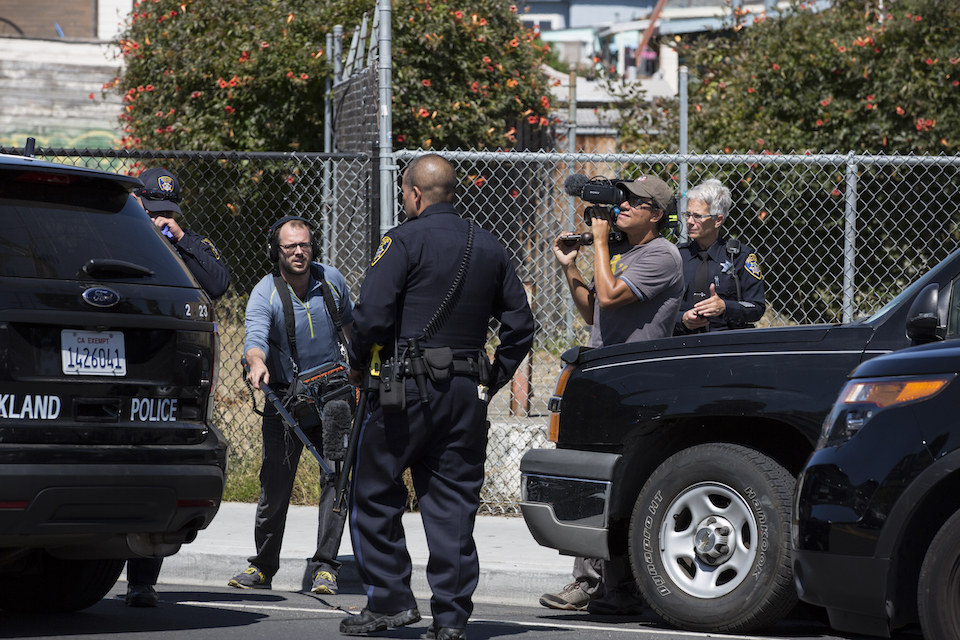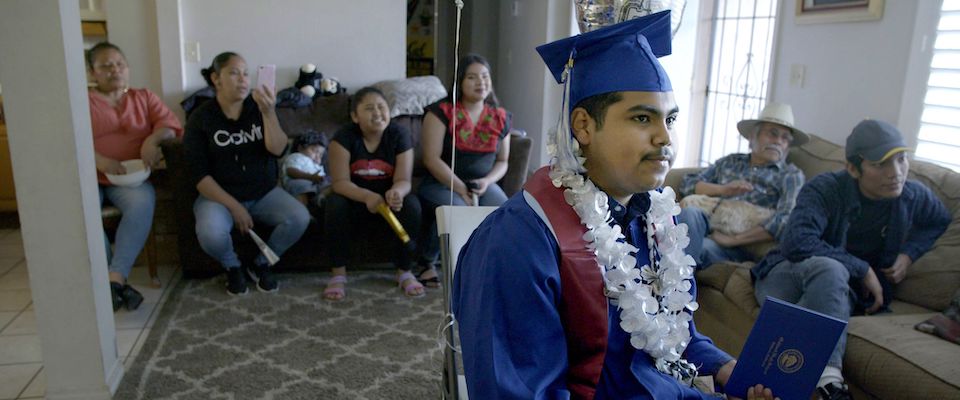Pete Nicks thought he knew what he was getting into when he started filming the Oakland Police Department in the fall of 2014. The department had long been under the thumb of a federal judge due to a series of lawsuits exposing poor management and pervasive abuses, but the OPD had a new chief who seemed poised to reform the troubled department.
An alum of UC Berkeley’s Graduate School of Journalism, Nicks did capture Chief Sean Whent’s efforts to mend the OPD in his award-winning documentary The Force, which opens in San Francisco and Berkeley on Sept. 15. But what had started as an embedded ride-along turned into an ongoing siege when the Black Lives Matter movement threw the department into perpetual crisis management. The already fraught situation took a left-turn into sordid scandal with late-breaking revelations that several OPD officers had sex with an underage young woman working as a prostitute. This was not the tale he’d set out to tell.
“We started filming before Ferguson and initially we were exploring the story of a department forced to reform because of past civil rights violations,” says Nicks, 49, a longtime Piedmont resident who won the 2017 Sundance Film Festival award for Best Directing, U.S. Documentary. “Our whole process shifted after Black Lives Matter took off and we moved toward an examination of a force confronting the rise of a populist movement.”

With minimal text on screen to set the scene and no voice over, The Force is a cinéma vérité journey that puts the audience onto Oakland’s rough and tumble streets. The tension crackles as officers contend with a deep legacy of distrust, particularly when African-American suspects die in police encounters. Following Nicks’s critically hailed documentary The Waiting Room, which unfolds at Highland Hospital, The Force is the second installment of a trilogy using Oakland’s public institutions as a window into social stratification in the United States. The concluding film will look at public schools.
“Cops, like doctors and teachers, have to confront on a ground level consequences of national values and history,” Nicks says. “We get worked up about Trump, but what we’re looking at in this film goes back from Ford to Carter to Reagan to Bush to Clinton and Bush again. For us to talk about accountability of teachers or police, we need to look at root causes. We’re trying to raise the question, What gives the community agency? The institutions to some degree reflect the values of the country.”
When it comes to reflecting values, Chief Whent is the kind of character that documentarians dream about, articulate, candid, and self-possessed. The film spends a lot of time with him as he walks a class of trainees through the historical minefield they’re entering in an era of camera phones and increasing oversight.
“We are the government,” he tells aspiring officers. “The nation was founded on the fundamental belief, a mistrust of government, and we are the most visible sign of that government. It’s not unreasonable to be asked to explain why you do what you do.”

The camera’s love affair with this truth teller, who shows the recruits a documentary sympathetic to the Black Panthers, comes to an abrupt end, shocking even for people who’ve followed the OPD’s travails closely. As news breaks about the illicit involvement of officers with a young woman then known as Celeste Guap, the city’s leadership seems to fall into chaos as a succession of police chiefs are appointed and dismissed in a matter of weeks. Mayor Libby Schaaf declares she’s determined to “root out a toxic macho culture” in the OPD.
Nicks credits his co-producers, Linda Davis and editor Lawrence Lerew, and executive producer Jon Else, with navigating the film’s sudden shift into what he calls “Shakespearian tragedy.” Chief Whent, the white knight reformer who seemed to have brought order to the OPD “panicked when the scandal broke,” Nicks says. “He was so close to satisfying the requirements of the negotiated settlement and removing the federal monitor. In the interest of preserving that momentum, he swept it under the carpet.”
Nicks came to the project with an unusual resume. An adopted mixed-race kid from an upper middle-class African-American family in Boston, he got involved with cocaine in college and ended up spending a year in federal prison, a redemptive story he explored in his hour-long documentary The Wolf, which was broadcast on ABC Nightline.
He grew up hearing stories about fraught encounters with police, “these narratives that black communities have shared for generations,” he says. “But I went into The Force with an ability to allow the story of the police to come forward without me inflecting it. I see the police as helping to save my life. They came in and altered my trajectory in more of a positive way.”
He’s not about to leave copland anytime soon. A few days ago, Nicks announced that Fox Searchlight hired him to direct a feature film based on investigative journalist Dick Lehr’s 2009 book The Fence: A Police Cover-up Along Boston’s Racial Divide. From The Force to The Fence, he’s getting ever closer to home.
“Not only am I from Boston, the D.A. in the case is a close family friend,” he says. “The black officer who was beaten by his fellow cops, I think I played basketball with him in high school. It’s crazy.”




















